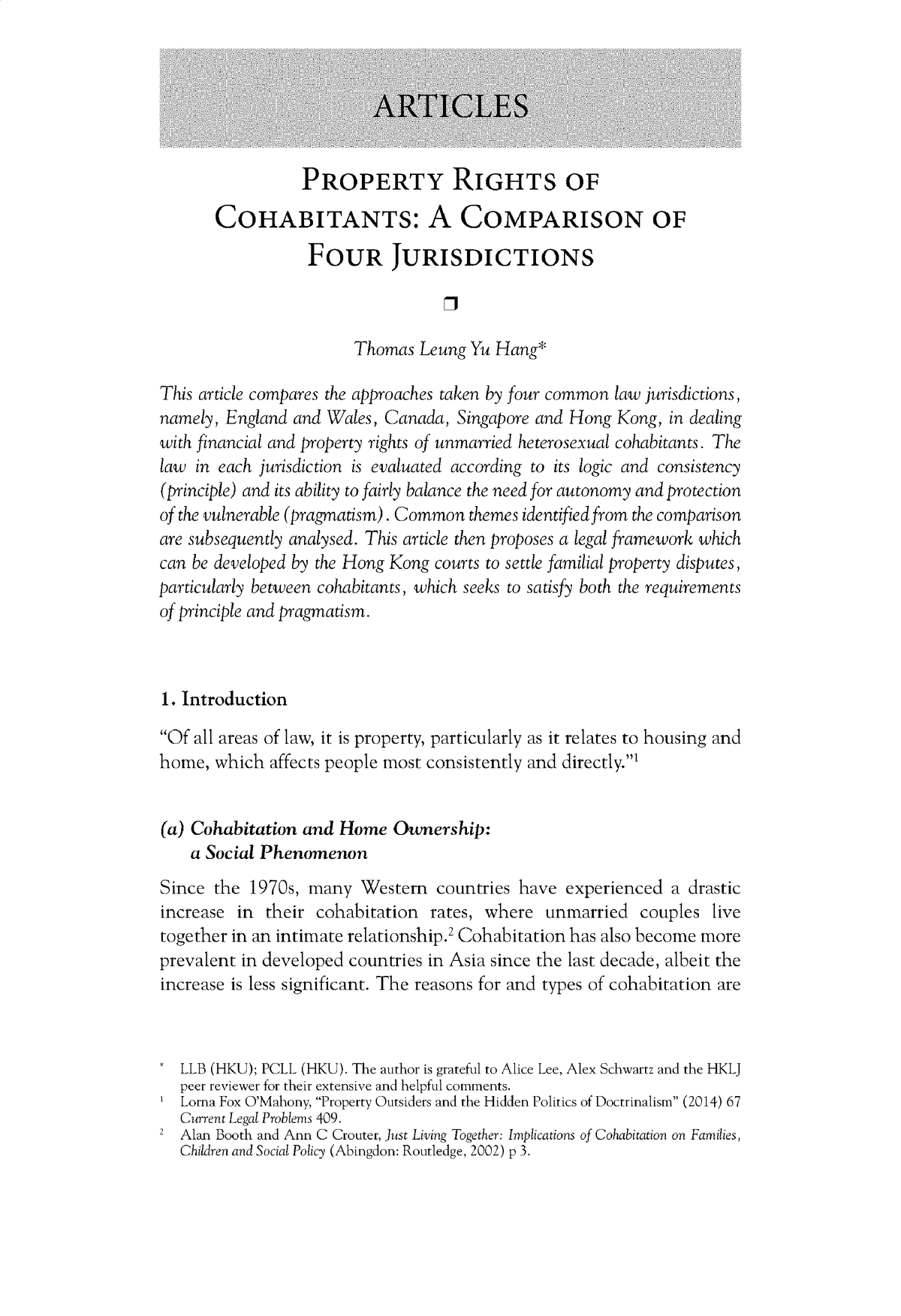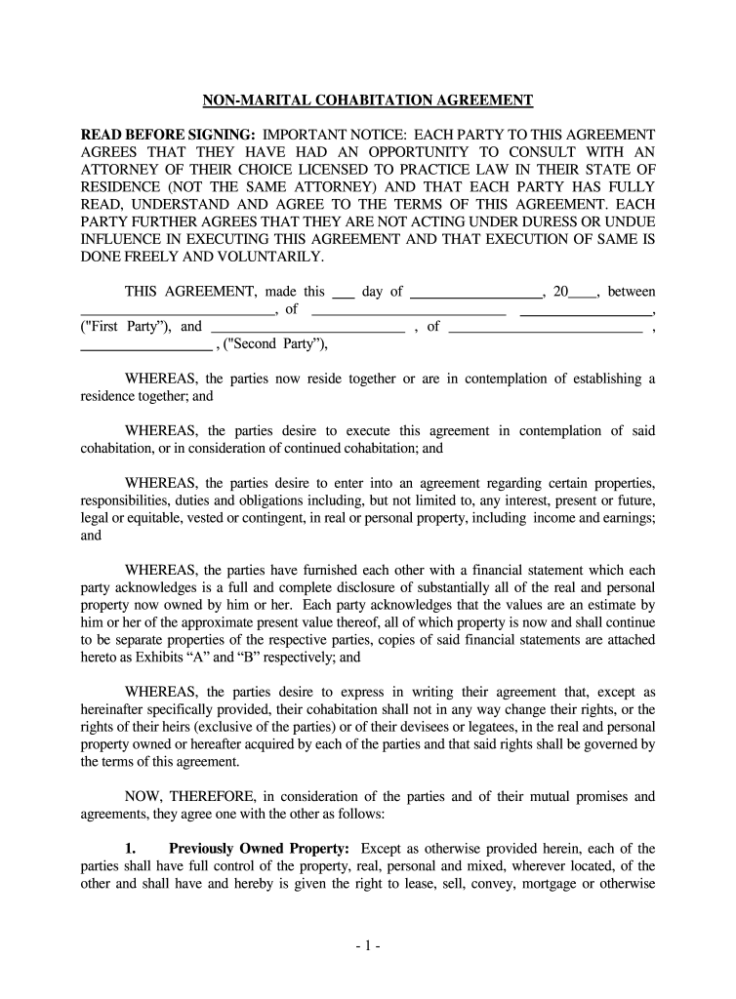Enforcement of Cohabitation Property Rights in Kansas
Cohabitation is becoming increasingly common in today’s society, and with it comes a need to understand property rights. In Kansas, cohabiting couples may find themselves in unique situations when it comes to their shared property. Unlike married couples, cohabitants don’t have the same automatic legal protections. This blog will explore how property rights are enforced for those who live together without being married, what types of property ownership exist, and how to safeguard your rights.
Understanding Cohabitation and Its Legal Implications

Cohabitation refers to two individuals living together in a long-term relationship resembling a marriage but without formal legal recognition. In Kansas, cohabitants face distinct legal implications regarding property ownership and rights. Here are some key points to consider:
- No Automatic Rights: Unlike marriage, living together does not automatically confer rights to property.
- Contracts Matter: Cohabitants can create legal agreements that outline property rights and responsibilities.
- Challenges in Separation: If the relationship ends, cohabitants may face complications in dividing shared property.
Understanding these implications is vital for anyone considering cohabitation. It can help avoid potential conflicts and ensure fair treatment for both parties involved.
Types of Property Ownership in Cohabitation
When it comes to cohabitation, understanding how property ownership works is essential. In Kansas, cohabiting couples typically fall into several categories of property ownership:
| Type of Ownership | Description |
|---|---|
| Joint Tenancy | Both partners own the property equally. If one partner dies, the other automatically inherits the entire property. |
| Tenancy in Common | Each partner owns a specific share of the property, which can be sold or passed on independently. |
| Single Ownership | One partner solely owns the property. The other has no legal claim unless specified in a contract. |
Choosing the right type of ownership can significantly impact both partners’ rights and responsibilities. It’s crucial to discuss and formalize agreements to avoid misunderstandings and ensure a fair division of property in case of separation.
Enforcement of Property Rights for Cohabitants
Enforcing property rights as a cohabitant can be complex. Without the legal protections afforded to married couples, cohabitants must navigate various challenges. In Kansas, it’s essential to understand how to assert your rights effectively. Here are some crucial points:
- Document Everything: Keep detailed records of shared property purchases and payments. This can help establish ownership claims later.
- Written Agreements: Consider drafting a cohabitation agreement that outlines each partner’s rights and responsibilities regarding property ownership.
- Seek Legal Counsel: Consult a lawyer familiar with family law in Kansas to ensure your rights are protected and to guide you through any disputes.
In case of a dispute, it’s essential to act quickly. Courts will consider the evidence presented, so having well-documented proof of your contributions and agreements can make a significant difference in enforcing your rights.
Steps to Protect Your Property Rights
Protecting your property rights while cohabiting is crucial for ensuring fair treatment and security in your relationship. Here are some steps you can take:
- Create a Cohabitation Agreement: This contract should detail property ownership, financial responsibilities, and what happens if the relationship ends.
- Keep Financial Records: Maintain records of all shared expenses, property purchases, and other financial transactions. This can help clarify ownership claims.
- Title Property Jointly: Whenever possible, put property titles in both names to ensure equal ownership rights.
- Regularly Review Your Agreement: As your relationship evolves, revisit your agreement to reflect any changes in your situation.
By taking these steps, you can minimize potential conflicts and protect your interests in the event of a separation.
Legal Remedies Available for Cohabitants
When disputes arise over property rights, cohabitants in Kansas have several legal remedies available to them. Understanding these options can help you navigate challenging situations more effectively:
- Partition Action: If cohabitants cannot agree on property division, they can file for a partition action in court, which allows for the sale or division of the property.
- Claim of Unjust Enrichment: If one partner has made significant contributions to the property, they may be able to claim unjust enrichment, seeking compensation for their investment.
- Specific Performance: In some cases, cohabitants can seek specific performance to enforce a written agreement regarding property rights.
It’s important to consult a legal professional to explore these options and determine the best course of action for your unique circumstances. Taking proactive steps can help ensure your rights are protected, regardless of how your relationship unfolds.
Impact of Common Law Marriage on Property Rights
In Kansas, understanding the impact of common law marriage on property rights is essential for cohabitants. While common law marriage can provide some legal protections similar to those of formally married couples, it’s crucial to recognize its specific requirements and implications. Here are some important aspects to consider:
- Definition of Common Law Marriage: In Kansas, a common law marriage is established when two individuals live together with the intent to be married, presenting themselves as a married couple.
- Property Rights: Once a common law marriage is recognized, both partners have equal rights to property acquired during the marriage, just like legally married couples.
- Proving Common Law Marriage: To prove a common law marriage, partners must demonstrate mutual consent to be married and cohabitation, along with evidence such as shared finances or joint property ownership.
It’s essential to know that common law marriage is not automatically assumed. If you think you may be in a common law marriage, consult a legal professional to understand your rights and how they affect your property ownership.
Frequently Asked Questions about Cohabitation Property Rights
As cohabitation becomes more common, many people have questions about property rights. Here are some frequently asked questions that can help clarify your understanding:
| Question | Answer |
|---|---|
| Do cohabitants have property rights? | No automatic rights exist; cohabitants must establish rights through contracts and documentation. |
| Can cohabitants inherit property? | Without a will, cohabitants generally do not have inheritance rights unless legally recognized as married. |
| Is a cohabitation agreement necessary? | While not required, it is highly recommended to protect both parties’ interests and clarify property rights. |
If you have additional questions or concerns, it’s wise to seek advice from a legal professional who understands family law in Kansas.
Conclusion on Cohabitation Property Rights in Kansas
Cohabitation is an increasingly popular living arrangement, but it comes with its unique challenges, particularly concerning property rights. In Kansas, understanding these rights and the implications of cohabiting without legal marriage is crucial. By taking proactive steps such as documenting property purchases, creating cohabitation agreements, and seeking legal advice, cohabitants can better protect their interests.
Remember, while common law marriage may offer some protections, it requires specific criteria to be met. Ultimately, being informed and prepared can help ensure that your property rights are recognized and upheld, fostering a secure environment for both partners in the relationship.


